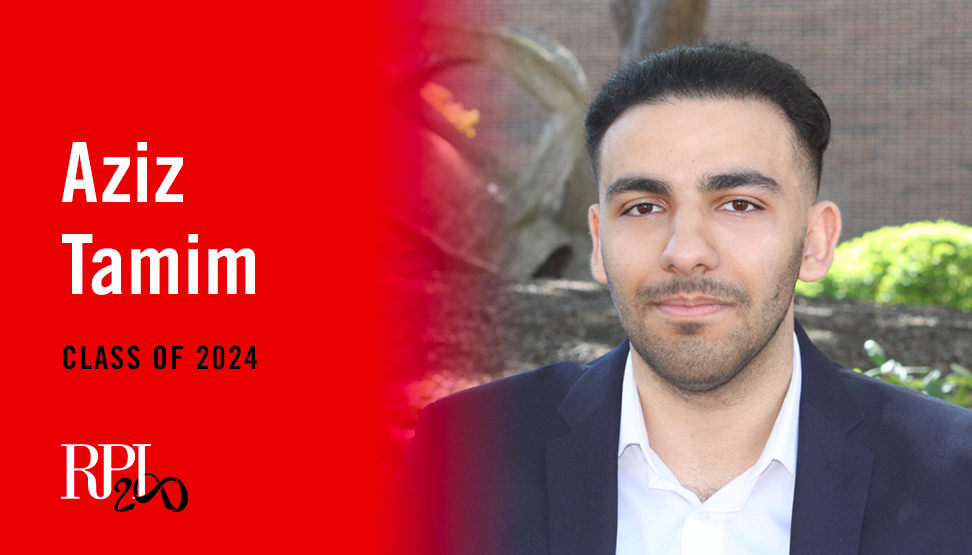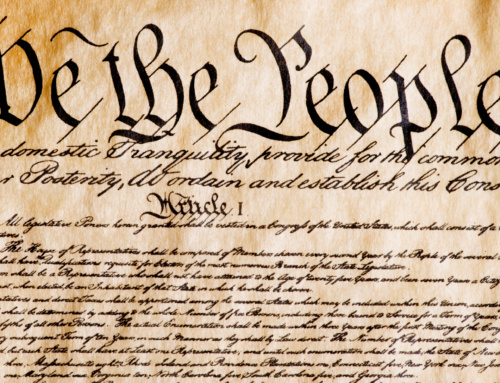By Samantha Murray
Aziz Tamim ’24 has experienced more upheaval in his life than most people do in a lifetime.
Tamim was born in Iraq in 2000, just a few years before the start of the Iraq War. During the war, one of his older brothers joined the American forces, and, like many other Iraqis who served with United States military, he faced threats from local militants, forcing the whole family to become refugees.
In 2007, the Tamim family moved to Syria. In 2011, at the start of the Syrian Civil War, they moved to Jordan. Because of his U.S. service, Tamim’s brother was then able to move the entire family — mother, father, and seven siblings — to the U.S.
In 2012, one of Tamim’s sisters was placed in New York’s Capital Region, and a year later, the rest of the family also settled there.
“I remember landing at JFK and glimpsing the New York City skyscrapers. There were no skyscrapers in Iraq, Syria, or Jordan. I was in awe,” Tamim said.
Fast forward 11 years, and Tamim is now graduating from Rensselaer Polytechnic Institute with a bachelor’s degree in civil engineering. Tamim’s coursework focused on structural engineering — the kind of engineering that goes into the towering buildings that make up the New York City skyline.
“From a young age, I knew I wanted to study civil engineering. Two of my older brothers are civil engineers. When we lived in Iraq, they would take me to construction sites and housing developments where they were working, and I loved going along with them,” Tamim said.
He vividly recalls one such field trip to an archeological site undergoing restoration.
“I remember looking to my right and seeing a 3,000-year-old Babylonian structure, then to my left, where there was a Roman column and 1,400-year-old mosque. I thought, ‘How were people able to make these structures so long ago?’” Tamim said.
As a child, Tamim was always building things.
“Unlike my American peers, I didn’t have LEGOs growing up, but I did have playing cards. I would make houses out of cards, but, of course, I didn’t like that they fell down so easily, so I glued them together. I know that is technically cheating, but like any good civil engineer, I wanted them to last,” he said.
The first six months in the U.S. were a struggle. “I was learning English, so it was hard to participate in school and make friends,” he said. After high school, Tamim attended Hudson Valley Community College for his associate’s degree in engineering sciences and eventually transferred to RPI for his bachelor’s.
Looking back at his RPI education, Tamim is most proud of his civil engineering capstone project, in which he developed a fully rendered model of an all-glass building worthy of any major city’s financial district.
“My capstone team’s building has these V-shaped columns inspired by financial buildings I’ve seen in New York City and Boston. For me, this design represents the way that the financial system is the origin and foundation of so many things,” Tamim said.
This fascination with the financial system spurred Tamim to minor in finance at RPI and discover a talent for investing. So far, his investments have yielded enough to pay off his parent’s mortgage, he said.
After completing a master’s in civil engineering at RPI next year, Tamim plans to pursue an MBA with a focus on finance and entrepreneurship. He already has a head start on one of those entrepreneurial projects: a financial model that lets users see all their personal finances in one place and helps them reach their financial goals.
Tamim says that RPI instilled in him the skills and discipline to pursue his dreams. His advice to current RPI students: Stick with it.
“RPI is going to challenge you, but it’s worth it. While you are taking classes and doing your projects, it might be hard to see the value of everything you are doing and learning. But, once you finish, you will look back and see how RPI made you a better engineer and a better person,” he said.


